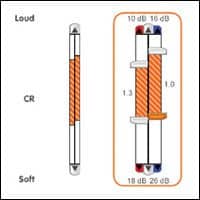Last Updated: 2008-04-25 13:56:41 -0400 (Reuters Health)
NEW YORK (Reuters Health) – Otitis media (OM) in the first year of life can impair brainstem and cortical auditory processing for years after the initial infection, according to a report in the April 2nd issue of Behavioral and Brain Functions.
Even OM of a short duration "in the first year of life can cause long-standing auditory processing deficits," Sandeep Maruthy from All India Institute of Speech and Hearing, Mysore, India told Reuters Health. "Hence, physicians should understand the need for early identification and quick treatment."
Maruthy and Dr. Jayaram Mannarukrishnaiah from National Institute of Mental Health Neuro Sciences, Bangalore, evaluated the effect of early onset OM on auditory brainstem and cortical potentials and investigated the persistence of these effects in 30 children.
The mean central conduction time was significantly increased and the mean amplitude of wave I and III of the click evoked auditory brainstem responses were decreased in 3-year-old children who had OM during their first year of life, the authors report. These impairments were no longer present in 4-year-old children who had early onset OM.
Similarly, the latencies (but not the amplitudes) of late latency response waves were significantly less among 3-year-old children with early onset OM. These changes were also not apparent in 4-year-old children who had OM during their first year of life.
Concluding "that the negative effects of early-onset OM on auditory brainstem responses and late latency responses persist till the children are 3 years old and disappear thereafter may not be logical," the researchers caution. "Such an interpretation is not appropriate based on the results of a cross-sectional approach, because there is no way to say that subjects aged 4.1 years and more in the present study experienced negative effects of early onset OM when they were 3.6 years or less."
"We are trying to investigate the sequel of OM through a longitudinal study," Maruthy said. "We are planning to use more complex stimuli, like speech, to record brainstem and cortical responses, as this would improve the sensitivity of the measure."
"If these findings are true in a longitudinal study," Maruthy added, "it calls for measures to reduce the chances of auditory deprivation during the active episodes of OM, for example, speaking closer to the child or being louder while speaking to the child so as to compensate for the reduced hearing sensitivity." One might also devise "measures to reduce the impact of auditory processing defects that have already occurred in terms of auditory training."
Behavioral and Brain Functions 2008;4:17.




